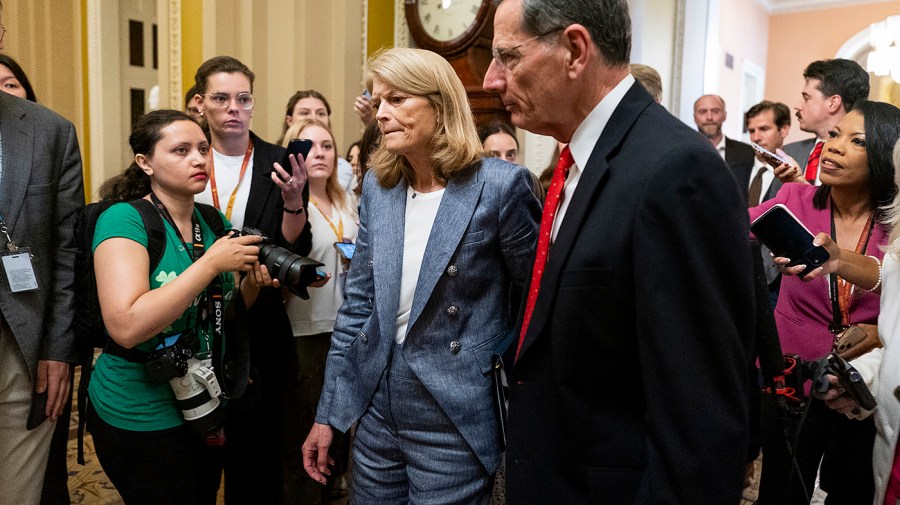Senate Republicans endured a grueling 26-hour session before finally passing President Trump’s ambitious tax and spending package early Tuesday afternoon. This legislative move brings the bill one significant step closer to the president’s desk. The legislation now heads to the House, where questions loom over whether the lower chamber can meet the GOP’s self-imposed July 4 deadline for passing the bill. The proposed legislation aims to make permanent many of the Trump tax cuts from 2017, eliminate certain taxes on tips and overtime, and implement the largest-ever cuts to Medicaid.
With the Senate’s work temporarily concluded, here are five critical takeaways as the bill transitions to the House.
Thune’s Legislative Triumph
Senate Majority Leader John Thune (R-S.D.) achieved his first major legislative victory since assuming leadership of the GOP conference. This success has bolstered his standing with both his members and President Trump, especially with more legislative battles on the horizon. The decisive vote was the culmination of months of negotiations, including last-minute discussions with Sen. Lisa Murkowski (R-Alaska) that sealed the deal.
Thune’s approach involved decentralizing power within the conference by empowering committee chairs and members, a strategy that has proven effective. Having previously navigated the confirmation of nearly all of Trump’s Cabinet picks through the Senate, Thune demonstrated his adeptness in managing the legislative process.
“He’s got patience that very few people are gifted with,” Sen. Mike Rounds (R-S.D.) remarked. “You can’t make anybody do anything. But what you can do is help them to get to a decision, and that’s what he’s doing.”
Thune’s ability to persuade was evident as he secured final votes, particularly through consistent communication with Murkowski. His leadership was praised by Sen. Katie Britt (R-Ala.), who highlighted his success in passing marquee legislation and empowering committee chairs.
Murkowski’s Strategic Negotiations
Sen. Lisa Murkowski (R-Alaska) once again leveraged her position to secure significant concessions for her home state. Her negotiations resulted in a carve-out from changes to the Supplemental Nutrition Assistance Program (SNAP), saving Alaska hundreds of millions of dollars. Additionally, she secured $50 billion for a rural hospital fund, doubling the original amount.
Despite criticism from some quarters, including Sen. Rand Paul (R-Ky.), who argued that the concessions added to the bill’s debt burden, Murkowski defended her actions as fulfilling her obligations to Alaskans.
“My response is I have an obligation to the people of the state of Alaska, and I live up to that every single day,” Murkowski stated.
Political Risks of Defying Trump
The legislative process underscored the political risks associated with opposing President Trump. Sen. Thom Tillis (R-N.C.) announced he would not seek reelection after losing his battle against Medicaid cuts and voting against a procedural hurdle. Trump’s reaction was swift, criticizing Tillis on social media and threatening to support a primary challenger.
This scenario serves as a cautionary tale for other senators facing reelection, highlighting the challenges of navigating political dynamics without alienating Trump.
Challenges Ahead in the House
The Senate’s passage of the bill sets the stage for a challenging path in the House. Speaker Mike Johnson (R-La.) faces the daunting task of securing enough votes to pass the Senate’s version of the bill, as any changes would require the Senate to vote again.
House Republicans have expressed dissatisfaction with the Senate’s alterations, with at least six GOP members prepared to vote “no.” The dynamics require Johnson, with Trump’s assistance, to rally support and achieve the necessary votes.
“On the text chains, on the phone calls, everyone is complaining,” a moderate House Republican told The Hill. “There’s a few little provisions people will say something positive about, but no one is happy with the Senate version.”
House Conservatives’ Dilemma
The bill’s journey to the House raises questions about whether House conservatives will face similar challenges as their Senate counterparts. Despite strong opposition from hard-liners, historical patterns suggest that presidential influence may sway votes in favor of the bill.
Rep. Ralph Norman (R-S.C.) and Rep. Chip Roy (R-Texas) have voiced their opposition, yet acknowledge the pressure they face to support the president’s agenda.
“If you look at the totality of this, I don’t believe this delivers what the president, what the administration, were working to deliver on,” Roy commented.
As the Independence Day deadline approaches, the House must navigate these complexities to determine the bill’s fate.
